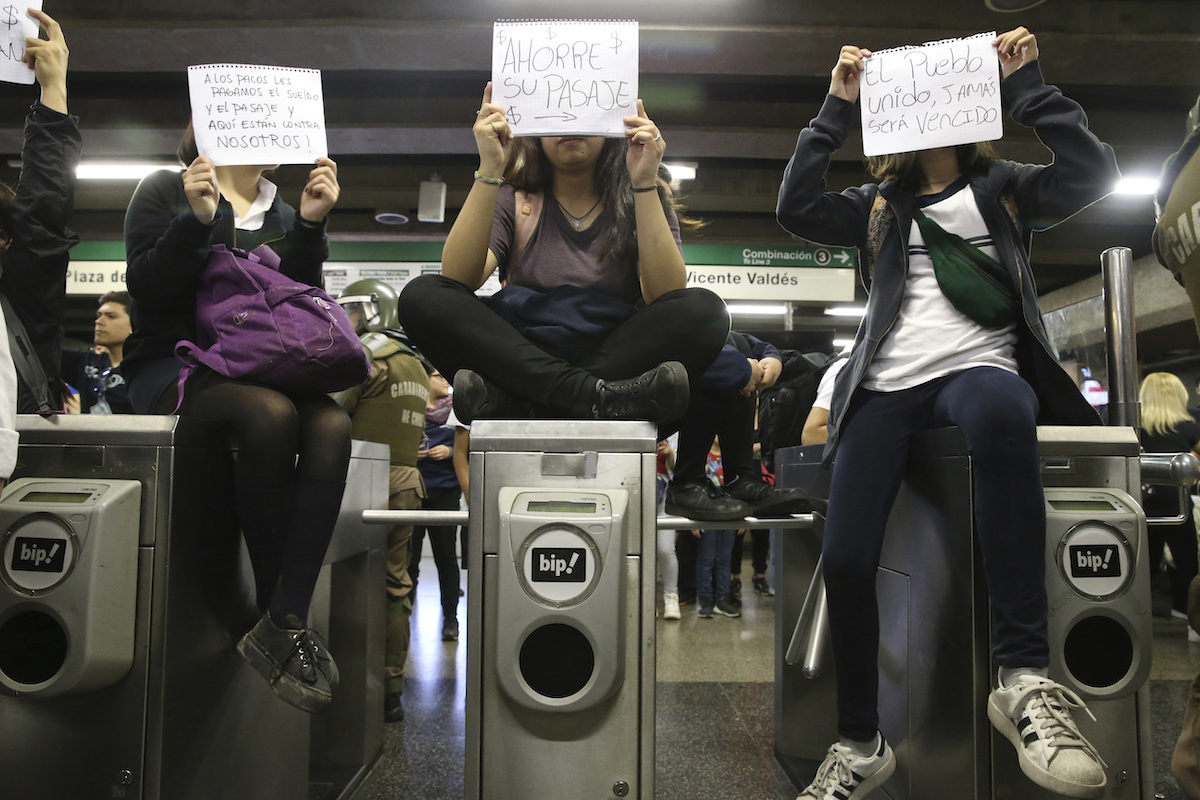

A demonstrator holds up his hands toward advancing soldiers during a protest as a state of emergency remains in effect in Santiago, Chile, Sunday, Oct. 20, 2019. (AP Photo/Esteban Felix)
This month, images of social upheaval in Latin America have made international headlines.
In Ecuador, footage of mounted police whipping an indigenous woman and threatening medical volunteers went global, as well as videos of police officers covered in flames while dodging Molotov cocktails thrown by protesters in Quito.
The Ecuador protests happened after President Lenín Moreno announced an austerity package negotiated as part of an IMF program. Indigenous organizations and workers unions called for a general strike and took their objections to the streets in early October. Television showed a defiant president not willing to back down. But it took only a couple of days for the protests to shut down the entire country.


Anti-government protesters cheer as they wait for a bus to return them home, in the aftermath of violent protests against the government, in Quito, Ecuador, Monday, Oct. 14, 2019. (AP Photo/Fernando Vergara)
Moreno’s government quickly labeled protesters as servile fools of Venezuela’s Nicolás Maduro, who was leading a plot to undermine Latin American democratic institutions. Ecuador’s president went as far as to claim —without proof— that hundreds of Venezuelan thugs infiltrated the indigenous protests. The governments of Brazil, Colombia, and Chile immediately embraced the claim that Maduro was behind the chaotic scenes in Ecuador and extended their support to the embattled Moreno government. Secretary of State Mike Pompeo signed a letter in support of Moreno and alerted that the U.S. was monitoring the presence of foreign influence in the protests.
Last week, violent protests broke out in Chile as a result of price hikes in the public transport system. Within a day, Chile’s President Sebastián Piñera established curfews and ordered the military to patrol the streets, leading to violent clashes and reports of human rights abuses. He addressed the nation and proclaimed that he was “at war against a powerful enemy.” Not naming anyone in particular, many of his supporters quickly pointed towards Caracas.


Students block the turnstiles to the subway protesting against the rising cost of subway and bus fare, in Santiago, Friday, Oct. 18, 2019. (AP Photo/Esteban Felix)
In Argentina, President Mauricio Macri often warns that if his political rival wins the upcoming election on October 27, Argentina will fall into the hands of Caracas. In Colombia, when students protested in Bogotá, they were accused of taken orders from the Venezuelan regime. The Colombian ambassador to the Organization of American States (OAS) claimed that the current Venezuelan migration crisis was part of Maduro’s master plan to deploy his sympathizers and spread socialism across Latin America.
Right now, calling your enemy a Maduro sympathizer is easy currency in Latin America. Describing your political opponents as Chavistas is perhaps the most effective tactic to neutralize their argument. Even Peru’s Martín Vizcarra —a fierce critic of Maduro— was soon named a Maduro protégé by his opponents after he decided to close Congress.
Time and again, Latin American governments use the crisis in Venezuela as the scapegoat to discredit genuine protest and undermine legitimate opposition. The failed socialist model is held high as a damning example of what will happen to those who demand a fairer and more equal society.
Today, Latin America remains the most unequal region in the world. According to the UN Economic Commission for Latin American and the Caribbean, the fortunes of Latin America’s billionaires grew by an average of 21% per year from 2002 to 2015—that is six times greater than the growth of the whole region’s GDP. As if that weren’t enough, much of this wealth is held offshore in tax havens. In other words, a sizable portion of the benefits of Latin America’s growth go to a small number of very wealthy individuals, while the region’s poor and incipient middle class see little or none of it.


Anti-government demonstrators protest in Santiago, Chile, Tuesday, Oct. 22, 2019. (AP Photo/Esteban Felix)
Frustrations run deep and there are very few impactful channels to express them. Democracy is about the contestation of interests and ideas, but in the parliamentary chamber, the board room and the city council, not by burning down shops, busses and media outlets. Of course, this requires the presence of strong institutions that can channel disagreements and represent the interests of minority voices, the powerless and the hungry. Latin American states are not exactly famous for the strength of their institutions. For lack of alternatives, people may feel that their only recourse is to take to the streets.
To propose solutions that work for all sectors of society will require wisdom and leadership from the political elite. At the very least, the political establishment could begin by acknowledging people’s real grievances and open national dialogues to address them. For better or for worse, this is what happened in France when protests resulted in President Emmanuel Macron’s national town-hall tour where he engaged in 92 hours of public debate with citizens. By contrast, simply invoking the authoritarian leader in Caracas as the cause of people’s frustration is a weak and cowardly attempt to ignore the real problem for the region.
***
Luis Ortiz is the co-founder and director of Voces, a Spanish-speaking podcast for political dialogue and commentary on Latin American affairs launched with the support of the McCourt School of Public Policy, Georgetown University. Twitter @voceslatamerica


